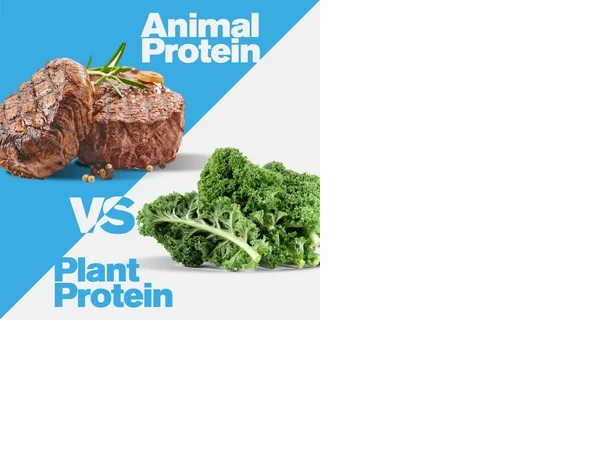Protein is an essential macronutrient necessary for the growth, repair, and maintenance of tissues in the human body. It is made up of amino acids, which are often referred to as the building blocks of protein. While both animal and plant-based foods contain protein, there are significant differences in their composition, digestibility, and nutritional profiles. In this comprehensive guide, we will explore the distinctions between animal and plant protein, their respective health implications, and considerations for incorporating them into your diet.
Animal Protein
Composition
Animal protein is derived from animal sources such as meat, poultry, fish, eggs, and dairy products. These foods typically contain all nine essential amino acids, making them complete proteins. Complete proteins provide all the essential amino acids that the body cannot produce on its own, making them particularly beneficial for muscle growth and repair.
Digestibility
Animal proteins are generally more easily digestible than plant proteins due to their composition and amino acid profile. The amino acids in animal proteins are highly bioavailable, meaning they are efficiently absorbed and utilized by the body for various physiological functions. This high digestibility contributes to the satiety and muscle-building effects of animal protein.
Nutritional Profile
In addition to being rich in protein, animal-based foods often contain essential nutrients such as vitamin B12, heme iron, zinc, and omega-3 fatty acids. These nutrients play crucial roles in energy metabolism, immune function, and overall health. However, some animal proteins, particularly red and processed meats, are also associated with higher levels of saturated fat and cholesterol, which may increase the risk of heart disease and other health issues when consumed in excess.
Plant Protein
Composition
Plant protein is found in a variety of plant-based foods, including legumes, beans, lentils, nuts, seeds, tofu, tempeh, and certain whole grains like quinoa and amaranth. Unlike animal protein, most plant proteins are incomplete, meaning they lack one or more essential amino acids. However, by combining different plant-based protein sources, such as beans and rice or hummus and whole-grain pita, individuals can obtain all essential amino acids and create complete protein meals.
Digestibility
Plant proteins are generally less digestible than animal proteins due to factors such as fiber content, anti-nutrients like phytates and lectins, and lower bioavailability of amino acids. However, cooking, soaking, sprouting, or fermenting plant-based foods can improve their digestibility and nutrient absorption. Despite being less digestible, plant proteins still provide valuable amino acids and nutrients necessary for optimal health.
Nutritional Profile
Plant-based foods offer a wide range of nutrients beyond protein, including fiber, vitamins, minerals, antioxidants, and phytochemicals. These nutrients contribute to various health benefits, such as improved digestion, reduced inflammation, and lower risk of chronic diseases like heart disease, diabetes, and certain cancers. Plant proteins are also naturally low in saturated fat and cholesterol, making them heart-healthy choices for individuals looking to reduce their intake of animal products.
Considerations for Incorporation
Dietary Preferences
Individual dietary preferences, cultural traditions, and ethical beliefs often influence whether someone chooses to consume animal or plant-based proteins. Both animal and plant proteins can play important roles in a balanced diet, and individuals can achieve their protein needs through a combination of both sources.
Health Implications
While animal proteins offer certain nutritional benefits, excessive consumption of red and processed meats has been linked to an increased risk of heart disease, stroke, cancer, and other health issues. In contrast, plant-based proteins are associated with lower rates of chronic disease and may offer protective effects against certain health conditions when consumed as part of a balanced diet.
Environmental Impact
The production of animal-based proteins, particularly from livestock farming, is associated with significant environmental impacts, including greenhouse gas emissions, deforestation, water pollution, and habitat destruction. In contrast, plant-based proteins generally have a lower environmental footprint, requiring fewer natural resources and producing fewer emissions compared to animal agriculture.
Variety and Balance
Regardless of whether you choose animal or plant-based proteins, prioritizing variety and balance in your diet is key to meeting your nutritional needs and promoting overall health. Incorporate a diverse range of protein sources, including lean meats, poultry, fish, legumes, nuts, seeds, and tofu, to ensure you receive a comprehensive array of essential nutrients and amino acids.
Conclusion
Both animal and plant proteins offer unique nutritional benefits and considerations. Animal proteins are complete, highly digestible, and rich in essential nutrients like vitamin B12 and heme iron. However, they may also contain higher levels of saturated fat and cholesterol, which can impact heart health when consumed in excess. Plant proteins, on the other hand, are often incomplete but offer a wide range of nutrients, including fiber, vitamins, minerals, and antioxidants. They are also associated with lower rates of chronic disease and have a lower environmental footprint compared to animal proteins. Ultimately, the choice between animal and plant-based proteins depends on individual preferences, dietary needs, and ethical considerations. By incorporating a diverse range of protein sources into your diet and prioritizing variety and balance, you can meet your nutritional needs and support your overall health and well-being.

